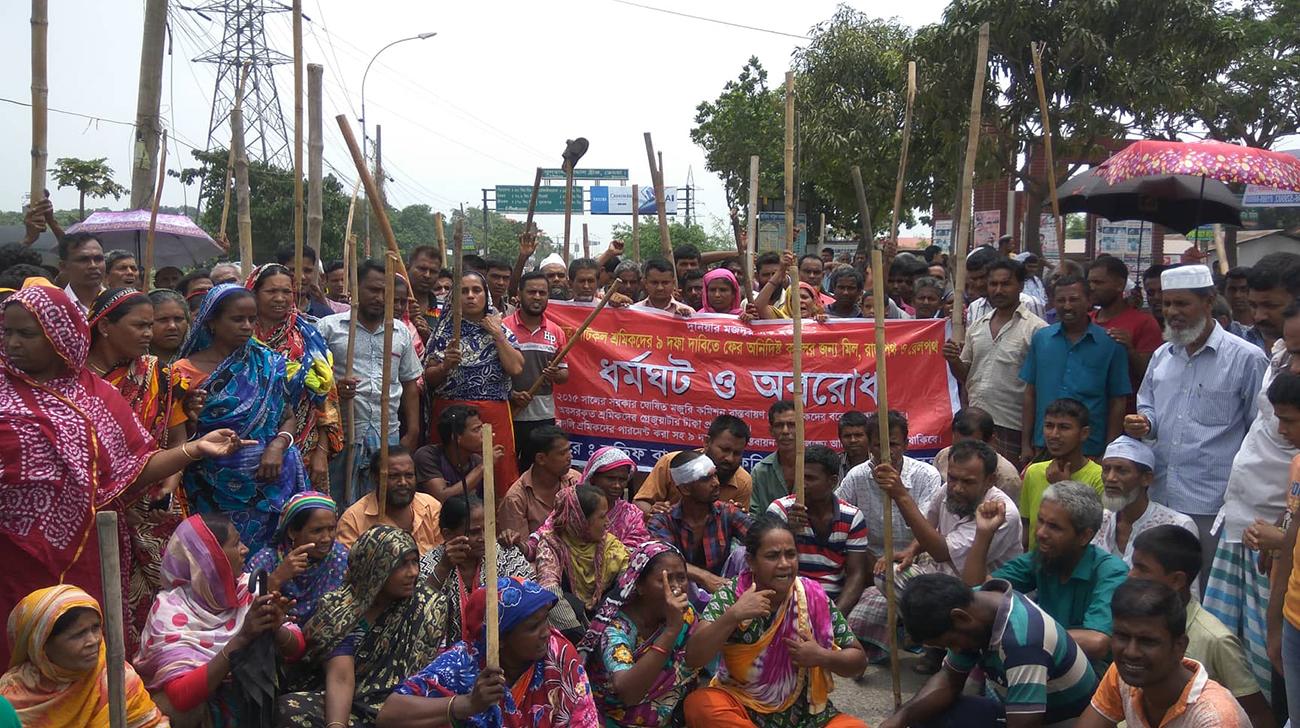Nearly 80,000 workers at 27 state-run jute mills under the Bangladesh Jute Mills Corporation have gone on strike, demanding complete and unconditional payment of their arrear wages. The strike has been organized by the Collective Bargaining Agents (CBA) and Non CBA Coordination Committee. They demand that the government clear their arrears before Eid. The workers have not been paid for 6 to 13 weeks, and have been demonstrating in different parts of Bangladesh’s industrial belt. The strike entered its fifth day on May 18.
On May 5, workers from Star Jute Mill in the Khulna district staged a walkout and demonstrated in front of their mill. Workers from Platinum Jute Mill and other mills in Khulna followed their lead and halted production in protest. Four days later, Dhaka’s Latif Bawani Jute Mill and Karim Jute Mill joined the agitation, following which the workers called for an indefinite, nationwide strike. Over the last week, thousands of mill workers from various districts in the country, including Chattogram and Rajshahi, have joined the strike.
Protesters said that non-payment of wages is pushing them to the brink of extreme poverty and starvation. For most of them, these wages are their only source of livelihood. With no alternative sources of income, they are being forced to take loans on high interest just to put food on the table.
A protester from Khulna told the Daily Star, “I am owed 8 weeks of arrears. There are around 1,950 workers like me in my mill. If we don’t get the money, how can we run our families with our meager income?”
Abul Hossain, general secretary of the workers’ union at Karim mills, said, “We cannot provide food to our children even in the month of Ramadan. We are protesting for just causes. The authorities just ask us go back to work. How long shall we work without pay?”
The workers have been taking to the streets to have their voices heard. Over the last two weeks, they staged a number of demonstrations in their respective districts, blocking off major national highways and railways, and chanting slogans against the authorities. While most of these protests have been peaceful, one of the demonstrations in Demra, Dhaka, took a violent turn when the police started using tear gas shells to disperse the protesters. This, however, has not deterred the workers who are continuing their agitations despite the threat of violence from the state apparatus.
For years now, inconsistent payment of wages has been a recurring issue. On September 7, 2015, the cabinet approved the eighth national pay scale which came into effect in July the same year. All government employees, including those of the Bangladesh Jute Mills Corporation, have been drawing their salaries under the new scale. However, not only have the thousands of mill employees not seen a wage hike in years but they are also struggling to get paid at all.
The call for timely payment of overdue wages is part of a larger demand that the workers have been agitating for since March. On March 13, they called a strike to push a nine-point demand, including regularization of pay, implementation of the 2015 national wage commission recommendations, increased allocation of funds to jute sector, permanent appointment of workers, as well as gratuities and provident fund for retired workers. Other demands included modernization and expansion of the jute mills to increase productivity, decrease of human labor, as well as more rigorous measures to check corruption among state liaisons.
On April 2, mill workers observed a 72-hour strike in Khulna region to drive home these demands. On April 15, the Jute Mills Workers League reiterated them by calling for a four-hour road and railway blockade and a 96-hour strike.
The government claims that the delay in payment is rooted in heavy losses incurred by the mills from high production costs. Financial experts, however, blame financial mismanagement and decreased production capacity due to inadequate investment in infrastructure and technology.
In the face of frequent demonstrations, the Jute Mills Workers League, the CBA and non-CBA leaders met with the State minister for labor and employment, Begum Monnujan Sufian, where they agreed to pay off at least some of the due wages by April 25. However, this promise could not be fulfilled, prompting the workers to launch the presently ongoing strike.
Salina Banu, a worker at the Crescent Jute Mills, said, “My past experiences suggest that no government did anything for jute mills workers without a greater movement.”
On May 7, the Parliamentary Standing Committee on Labor and Employment asked the Labor and Employment Ministry to take the necessary measures to give out wage slips to state-run jute mill workers, starting May 18. The committee has also ordered that their wages be fixed by May 17.
Workers claim that, over the years, the government has been addressing the issue of non-payment of wages using temporary measures. They are hoping this year’s protests will compel the government to take concrete, long-term steps for the redressal of their issues. A meeting between workers’ leaders and the Bangladesh Jute Mill Corporation is scheduled for May 18 in Dhaka. Sohrab Hossain, secretary of a workers’ platform at Crescent Jute Mills, said, “We are waiting for May 18. We hope the wage commission would make a commitment on that day. If we don’t get paid within the time, we will go for tougher demonstrations.”





